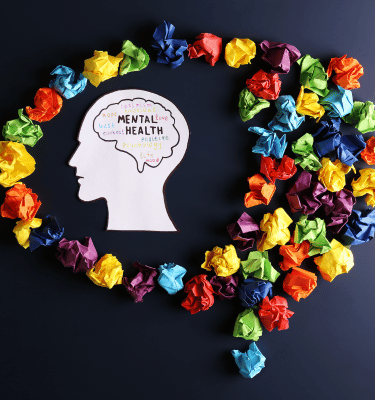Mental Health Self Care Tips
Mental Health Self-Care Tips

February 28th, 2024 | Mental Health
How Taking Care of Your Mental Health Spills Over Into Every Aspect of Health
About 95% of serotonin, also known as the “happy hormone,” is made in the gut1. Research suggests that low levels of serotonin are associated with depression and anxiety2,3. While this is good to know when tackling mental health issues from various angles, it also demonstrates the intricate connection between mental well-being and the rest of the body’s systems.
For instance, taking care of your gut health is essential for good mental health. Many also experience a “gut feeling” when stressed or are unsure about a big decision; This is surprisingly real! Your mental health has the capacity to impact your physical health and vice versa.
Simply put, mental health and physical health don’t exist in separate bubbles. So, what are some mental health self-care tips that account for all of this? How can you enhance your mental wellness and overall well-being? Let’s take a look!

The 7 Pillars of Self-Care
Self-care means taking action and steps to look after yourself emotionally, mentally, and physically. This may mean performing deep breathing exercises daily or getting sun and exercising regularly.
Some experts claim there are seven pillars of self-care, which we all should incorporate into our regular routines. These include:
●Mental self-care
● Emotional self-care
● Physical self-care
● Environmental self-care
● Spiritual self-care
● Recreational self-care
● Social self-care
Interestingly, when hitting a few of the above pillars, you actually have a cascading effect on all of them. For instance, performing recreational self-care, such as playing soccer or participating in your favorite hobby, may also mean looking after your physical, emotional, social, or mental self-care factors too. In the next section. We’ll take a closer look at mental health self-care tips you can apply to enhance your entire life.
5 Self-Care Strategies
The mental self-care tips below can help you find a state of balance and purpose. They also help address some of our basic needs, helping our bodies and minds to thrive.
It’s important to note that when making any drastic changes in your life, you should consider taking it one step at a time. Implementing new habits or routines slowly can help you avoid pitfalls and the inevitable overwhelm that may happen when you try to do it all at once.
1. Eat Healthy
The gut-brain axis involves communications from the brain to the gut and vice versa. In fact, issues in the gut can lead to poor mental health, including anxiety and depression, and cognitive function4. And a lot of this comes down to the gut microbiome.
The gut microbiome is made up of trillions of bacteria. These bacteria, both good and bad, help digest your food. Yet, certain foods can hinder or help this delicate bacterial balance. For example, loads of processed foods tend to have detrimental impacts on the microbiome. Meanwhile, a healthy diet full of whole foods, like vegetables and fruit, can help maintain the health of the microbiome. On top of fruits and veggies, other foods that are good for your microbiome include probiotics like: Greek yogurt, sauerkraut, kefir, and kimchi. In turn, the gut bacteria can produce sufficient serotonin, which will boost mood, sleep, and overall health.
2. Exercise Regularly
Daily walks and weightlifting are shown to be some of the best forms of exercise for the human body. Finding something you love is even more important since moving a little bit is always better than not moving at all. This may take some experimentation, such as trying out that local Zumba class or paying for an introduction membership at your local yoga studio.
Exercise enhances our mental well-being by stimulating the release of endorphins5. Endorphins help reduce stress, decrease pain, and improve overall well-being. In fact, endorphins are an argument to exercise even when you “just don’t feel like it.” Moving your body can actually improve your mood and energy levels!
3. Prioritize Sleep
Getting a proper bedtime and sleep routine in place has the capacity to improve your life in more ways than one. A regular sleep cycle helps regulate hormones within the body, including those responsible for our mood and mental state of mind.
As far as mental health self-care tips go, this is definitely one that takes the top spot! When you experience better sleep, you’ll have more energy to create new habits around eating healthier or exercising each day. Most importantly, you’ll feel better and even experience better cognitive functioning, which can help you excel in multiple areas of your daily life.
4. Set Goals & Go After Them!
Setting goals can provide us with a renewed sense of purpose. Research even suggests doing so may help reduce symptoms associated with depression and anxiety6. These goals can further provide us with improved self-esteem and confidence, especially when we inch closer to them and accomplish them.
The key is to make each goal a S.M.A.R.T. goal. This means every goal must be specific, measurable, attainable, realistic, and time-oriented. It can also help to break each big goal down into smaller goals, making them appear more achievable and less daunting.
5. Try Infrared Sauna Therapy
For years, light has been considered a wonderful option to help reduce symptoms associated with mental illness. A 2009 study suggested infrared light can also offer a viable treatment option for those with depression and anxiety7. Thus, regular sessions in an infrared sauna or infrared sauna blanket, such as the HEALiX Infrared Sauna Blanket, might just be the missing self-care routine you need.
With just three to four 30-45 minute sessions a week, you can use infrared therapy to enhance your mental wellness and receive various other health benefits, such as reduced wrinkles, improved heart health, and more!



